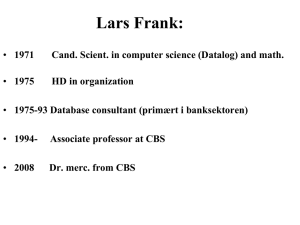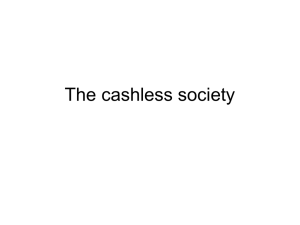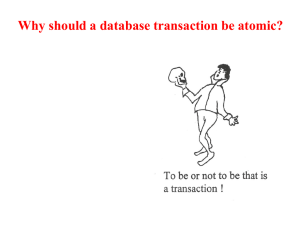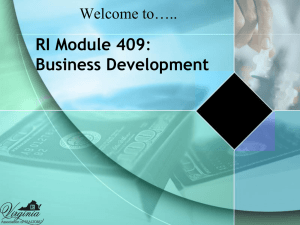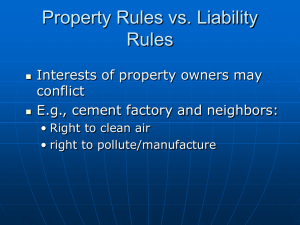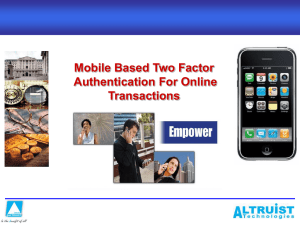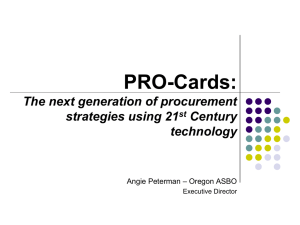The Relaxed Atomicity Property
advertisement
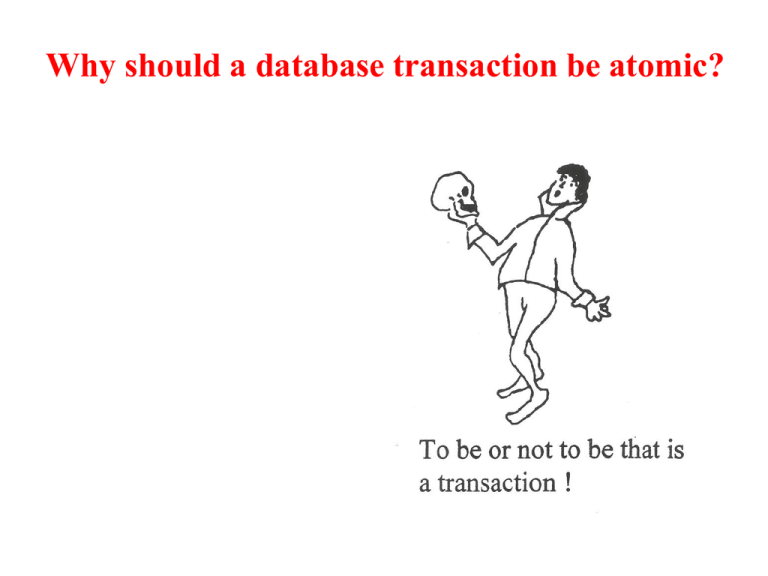
Why should a database transaction be atomic? ABORT = Removal of the updates of a transaction An abort is implemented by a DBMS roll back recovery where the before images of the log-file are restored in the database tables. What can initiate an automatic abort? When should a programmer initiate an abort? The Relaxed Atomicity Property: Root transaction Committing subtransaction The Relaxed Atomicity Property: Root transaction Committing subtransaction In E-commerce the following locations are involved: Seller, Bank of Seller, Buyer, Bank of Buyer, and Card issuer. In which locations should the compensatable, pivot and retriable subtransactions be executed? Nested atomic subtransactions: Subtransactions of a compensatable subtransaction must also be compensatable. Subtransactions of a retriable subtransaction must also be retriable. Subtransactions of a pivot subtransaction must either be compensatable Where would you recommend to use retriable or retriable. sub-subtransactions in E-commerce? The Relaxed Atomicity Property: Root transaction Committing subtransaction How would you implement relaxed atomicity in a realtime money transfer between two domestic banks? The Relaxed Atomicity Property: Root transaction Committing subtransaction How would you implement relaxed atomicity in a realtime money transfer between banks in different contries? The Relaxed Atomicity Property: Root transaction Committing subtransaction How would you implement the different types of the 0-safe design by using relaxed atomicity? Implementation of retriable subtransactions: Manage compensatable and pivot subtransactions Remote Procedure Call (RPC) Update Propagation (UP) Manage retriable subtransactions In practice SOA services function as RPCs and may also be used to implement UP. Architecture for PULL Update Propagation from A to B: System A System B Local database including a transaction file. Local database including a state record. Architecture for PUSH Update Propagation from A to B: System A Local database including a transaction file. System B Local database including a transaction file. PULL versus PUSH Update Propagation: • PULL UPs are batch orientated, as transaction records are only transferred periodically. • PULL UPs have smaller execution cost. • PULL UPs have a smaller programming cost. • PULL UPs of transaction records are single threaded. • PULL UPs may be initiated by a push. • PULL replication from a primary copy may have lost transactions but not lost update anomalies. Structure of a global update transaction: •[The user starts to read data] •The user enters data for the update process. •The user starts the update using the model with compensatable, pivot, and retriable subtransactions. Syntax for State diagrams: Event [condition] /Action UML-Statechart diagram for a global transaction Routing by using flexible transactions. Question 1. Describe a Petri net workflow for flexible transactions. Question 2. Change the Petri net workflow in such a way that it also functions for recovered transactions. Syntax for the State diagram: Event [condition] Action The main problems of mobile computing: •Disconnections •Location dependency •Resource constraints •Low bandwidth The disconnection problem: Mobile host Communication cell operated by a mobile support station 1 4 disconnection Foreign agent Wiered network 2 3 Database server The location dependency problem: Mobile host Communication cell operated by a mobile support station 1 4 5 Foreign agent Wiered network 2 Moved Mobile host 3 Database server New foreign agent Communication cell operated by the new mobilesupport station Push message propagation: Mobile host Communication cell operated by a mobile support station 1 4 disconnection 6 7 Foreign agent Wiered network 2 3 5 push 8 acknow ledgement Database server Pull message propagation: Mobile host Communication cell operated by a mobile support station 1 4 disconnection 5 8 Foreign agent Wiered network 2 3 6 Database server 7 pull the answer Pull message propagation after motion: Mobile host Communication cell operated by a mobile support station 1 Moved Mobile host 4 5 6 7 10 New foreign agent Foreign agent 8 Wiered network Communication cell operated by the new mobile support station 2 3 Database server 9 Atomicity in mobile computing: How can SOA help in implementing mobile atomicity? Exercise: Describe and design an integrated distributed database including mobile databases where an e-commerce supplier can deliver its products direct to its customers and at the same time get automatic acknowledgement for the delivery in both the database of the supplier and the customer. Describe also the integrated workflow of the integration. Can the earlier described distributed ERP system be used? Customers Orders Locations Orderlines Productstocks Products Input Input is supplier orders or deliveries. New Supplier orders. Orderlines are replicated to the mobile controllers Workflow for making mobile control of supplier deliveries. Reduced product delivery Product Delivery AND SPLIT deliveries larger than Accepted product ordered Select deliveries AND JOIN a control action Update the local stock Delivery matches an Orderline Accepted product deliveries Reduced orderline Orderlines Delivery less than ordered AND SPLIT Replicate the mobile registrations to the central ERP system Delivery is not ordered Error reports End of workflow End of session Thank you !!! Implementation of distributed CSCW: •Describe compensatable, pivot, and retriable subtransactions for the most important update transactions •Describe the countermeasures recommended for the most important transactions Objectives for a DDBMS (Distributed DataBase Management System): Distribution transparency, that is Replication transparency Distributed optimizer Distributed ACID properties Homogeneity as Heterogeneity is not in the marked Distribution architectures Synchronous distributed database management system (DDBMS) Central database with distributed clients Multidatabases with flexible transactions. Hot backup possibility n-safe and mirroring Only mirroring is possible 0- safe, 1 safe and mirroring Read performance/ capacity Best Worst Average Write performance Worst Average Best Blocking possibility Yes No no Ease of failure recovery Worst (The systems are very complex) Best Best Disaster recovery Best Worst Average The probability of lost data[1] Best. pn Worst p Average Transaction logging Not supported Not supported Recommended Availability[2] 1-qn 1-q 1-qn Atomicity Best Best Best Consistency Best Best Worst Isolation Best Best Worst Durability Best Best Best Develop-ment costs Best Best Worst Evaluation criteria (Relaxed ACID properties) Distributed DataBase Management System(DDBMS) TM = Transaction Manager. DM = Data Manager. Global user views Distribueret data dictionary: Global conceptual view Distribution schema Fragmentation schema Allocation schema Local conversion schema Other Locallocations conver- Local schema Local schema Server Server sion schema Other locations Distributed DataBase Management System(DDBMS) TM = Transaction Manager. DM = Data Manager. Homogenious DDBMS. TM dictionary DM dictionary Heterogenious DDBMS. TM dictionary TM dictionary Conversion schema Commit by using distributed 2PC: Abort with distributed 2PC
